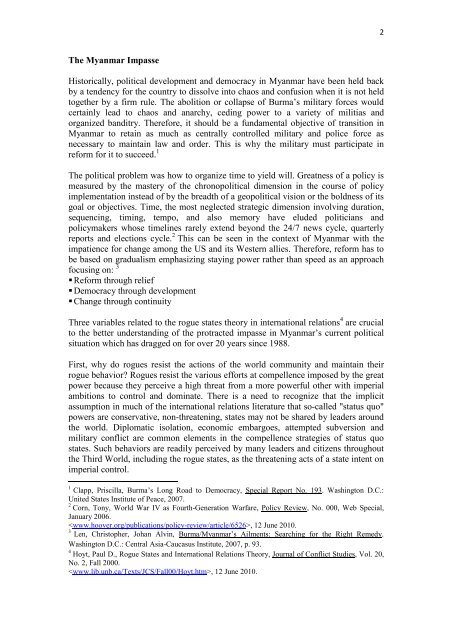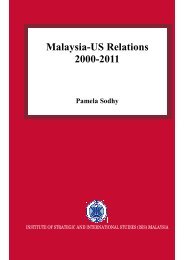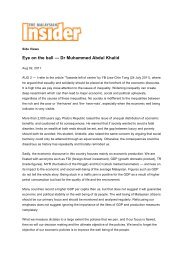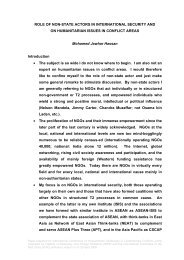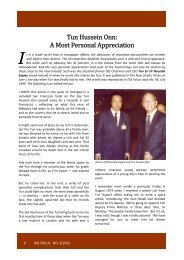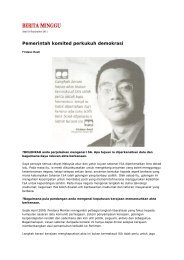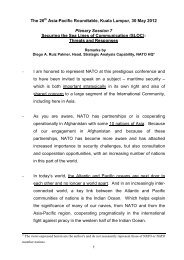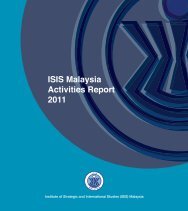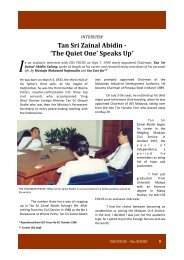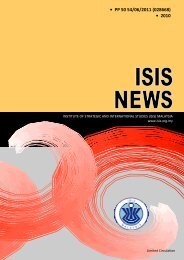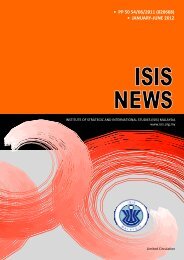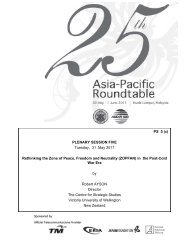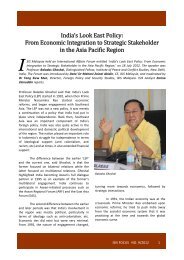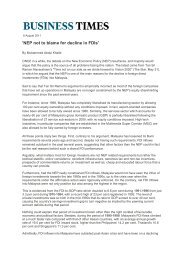Soft Power of Defence Diplomacy: A New Approach ... - ISIS Malaysia
Soft Power of Defence Diplomacy: A New Approach ... - ISIS Malaysia
Soft Power of Defence Diplomacy: A New Approach ... - ISIS Malaysia
Create successful ePaper yourself
Turn your PDF publications into a flip-book with our unique Google optimized e-Paper software.
2The Myanmar ImpasseHistorically, political development and democracy in Myanmar have been held backby a tendency for the country to dissolve into chaos and confusion when it is not heldtogether by a firm rule. The abolition or collapse <strong>of</strong> Burma’s military forces wouldcertainly lead to chaos and anarchy, ceding power to a variety <strong>of</strong> militias andorganized banditry. Therefore, it should be a fundamental objective <strong>of</strong> transition inMyanmar to retain as much as centrally controlled military and police force asnecessary to maintain law and order. This is why the military must participate inreform for it to succeed. 1The political problem was how to organize time to yield will. Greatness <strong>of</strong> a policy ismeasured by the mastery <strong>of</strong> the chronopolitical dimension in the course <strong>of</strong> policyimplementation instead <strong>of</strong> by the breadth <strong>of</strong> a geopolitical vision or the boldness <strong>of</strong> itsgoal or objectives. Time, the most neglected strategic dimension involving duration,sequencing, timing, tempo, and also memory have eluded politicians andpolicymakers whose timelines rarely extend beyond the 24/7 news cycle, quarterlyreports and elections cycle. 2 This can be seen in the context <strong>of</strong> Myanmar with theimpatience for change among the US and its Western allies. Therefore, reform has tobe based on gradualism emphasizing staying power rather than speed as an approachfocusing on: 3• Reform through relief• Democracy through development• Change through continuityThree variables related to the rogue states theory in international relations 4 are crucialto the better understanding <strong>of</strong> the protracted impasse in Myanmar’s current politicalsituation which has dragged on for over 20 years since 1988.First, why do rogues resist the actions <strong>of</strong> the world community and maintain theirrogue behavior? Rogues resist the various efforts at compellence imposed by the greatpower because they perceive a high threat from a more powerful other with imperialambitions to control and dominate. There is a need to recognize that the implicitassumption in much <strong>of</strong> the international relations literature that so-called "status quo"powers are conservative, non-threatening, states may not be shared by leaders aroundthe world. Diplomatic isolation, economic embargoes, attempted subversion andmilitary conflict are common elements in the compellence strategies <strong>of</strong> status quostates. Such behaviors are readily perceived by many leaders and citizens throughoutthe Third World, including the rogue states, as the threatening acts <strong>of</strong> a state intent onimperial control.1 Clapp, Priscilla, Burma’s Long Road to Democracy, Special Report No. 193. Washington D.C.:United States Institute <strong>of</strong> Peace, 2007.2 Corn, Tony, World War IV as Fourth-Generation Warfare, Policy Review, No. 000, Web Special,January 2006., 12 June 2010.3 Len, Christopher, Johan Alvin, Burma/Myanmar’s Ailments: Searching for the Right Remedy.Washington D.C.: Central Asia-Caucasus Institute, 2007, p. 93.4 Hoyt, Paul D., Rogue States and International Relations Theory, Journal <strong>of</strong> Conflict Studies, Vol. 20,No. 2, Fall 2000., 12 June 2010.


